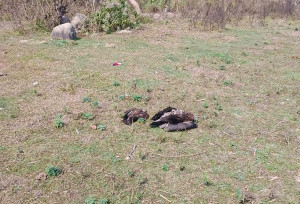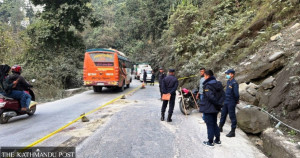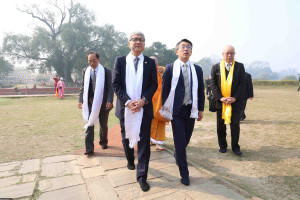Lumbini Province
Rupandehi farmers grapple with fertiliser shortage after dry spell
Limited local supplies and smuggling of Indian urea are forcing farmers to pay two to three times the subsidised rate, raising concerns over the paddy harvest.
Dipendra Baduwal
Farmers in Marchwar, Rupandehi, who lost crops during last month’s dry spell, are now facing a new challenge–a black market for fertiliser. With local supplies scarce, Indian urea is selling for two to three times the subsidised price.
Subsidised urea is officially available at Rs900 per bag through local cooperatives, but farmers who are unable to obtain it are paying between Rs2,500 and Rs3,500 for Indian urea delivered directly to their homes.
Locals say some traders bring fertiliser across the border overnight, store it near the border, and then distribute it to local markets or households at inflated rates.
Rama Shankar Yadav from ward 7 of Sammarimai Rural Municipality said a 45-kilogramme bag costs 280 Indian rupees in India. Yadav said transporters reportedly buy a bag for up to Rs600 and sell it at Rs2,200 at the border. At the time of home deliveries it costs as much as Rs3,500.
The Nepali administration has eased regulations to allow temporary imports to meet demand, but farmers say soaring prices are straining their budgets. Najabuddin Musalman from ward 7 of the municipality, who needs 40 bags annually, has not received any from cooperatives and must pay Rs3,500 per bag for Indian urea.
Rama Shankar said the cost of a single Indian bag could purchase three bags in Nepal. “Earlier, we struggled because of the lack of rain. Now, the shortage of fertiliser is our main concern. We will be relieved the day we finally get it,” he said.
Indraraj Kohar, who cultivates 20 kattha (1 katha equals 3645 sq. ft.), has received only two bags of urea so far this season. He said his fields require 100 kilogrammes of DAP, 200 kilogrammes of urea, and 50 kilogrammes of potash annually, and he is now searching for Indian urea.
Two to three years ago, fertiliser in India was cheaper than in Nepal, prompting border farmers to import it to meet local shortages. At the time, a bag cost Rs500 to Rs1,000. Non-agricultural uses, including plywood and alcohol production, also drove smuggling, a local resident Ram Bikash Chaudhary said. “Bags are now sold at Rs2,250 at the border, which makes it difficult for farmers,” he added.
Smuggled fertiliser is transported further into the northern parts of the district along the Bhairahwa-Lumbini road via Jhulnipur, with warehouses in Rohini, Marchbari, and Lumbini. Farmers buy from these warehouses at high prices.
Shortage in cooperatives
Cooperatives have struggled to meet demand. Mahalakshmi Cooperative, serving 1,001 households across 10 villages, has distributed 850 bags out of 1,007 required. Each bigha of land requires one bag of urea. Paddy has been transplanted on over 800 bighas.
Manager Mahesh Lodh said disputes occur when farmers pay for fertiliser but do not receive it. On distribution days, queues begin forming at midnight, and crowding continues after the cooperative opens at 7 am. “Even when we try to supply everyone, we face abuse, so police are called on distribution days,” he said.
Bhawani Savings and Multipurpose Cooperative in ward 5 of Sammarimai Rural Municipality has received only 340 bags for 1,600 households, though 10,000 bags are needed for its 11 communities. “We can supply barely 2,000 bags a year; the rest must come from Indian imports,” manager at the cooperative Ashok Kumar Tiwari said.
Farmers say importing fertiliser from India is difficult, with Indian security personnel reportedly harassing them. After crossing into Nepal, local authorities can also make access challenging.
Despite widespread smuggling, the local administration has largely ignored enforcement. Residents say fertiliser is openly sold near border settlements during the day, while northern districts see transport in the morning, evening, and at night, often stored in vacant buildings or agrovet centres.
Jitendranath Shukla, former chair of the rural municipality, said, “Bringing fertiliser from India to spray in fields is not a major issue, but authorities should curb black marketing. That has not happened.” He said that farmers are bearing the brunt of shortages and inflated prices.
Deputy Superintendent of Police Suraj Karki said fertiliser sometimes bypasses enforcement. “Open imports are not permitted. Smuggling and sales at inflated prices constitute black marketing and will be dealt with,” he said. Chief District Officer Tokaraj Pandey said that armed forces are monitoring the border and will take action against smuggling and black marketing.
Farmers remain concerned as both shortages and inflated prices threaten the paddy harvest.




 16.33°C Kathmandu
16.33°C Kathmandu















